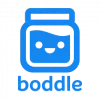Take a look inside 11 images
Boddle
Pros: Tons of practice/data. Good contextual support including video explainers for questions.
Cons: Games aren't integrated with math. Instruction is algorithmic vs. conceptual.
Bottom Line: This program incentivizes math practice -- and offers useful supports -- but could use more opportunities for deep, conceptual learning.
Boddle is great used as a classroom incentive or reward, since students will work on math but also get the chance to play all sorts of games and get creative with their Boddle-head. If you're using Boddle as a station activity, you'll want to choose a time limit as the key parameter -- instead of a number of questions -- so that students will be ready to move on to the next station/activity.
If you're using it more as individualized practice, make use of the assignment options, which can be individualized or based on groups or the whole class. Each question has a link to a video explainer that walks students through how to work through the question, so students should be fairly independent. That said, videos seem to focus on algorithms, so teachers shouldn't rely on the program for initial learning and concept building. All students who start Boddle without an initial assignment work through a placement test that takes about a half hour. Teachers can use the dashboard data from this test to develop learning plans and assignments for students. Teachers might want to also build a post-assessment using a mixture of questions that students found too challenging. Note that during play, teachers can view students' work in real time and use this data to conference with students in case they're having a lot of trouble. The dashboard also has a handy snapshot of each student's performance, with links to the instructional videos and skills students were working on, which is handy for planning future lessons.
Boddle is an adaptive math program that blends practice with cute animation and games. To progress, students work through math practice questions. Each question has voiced audio, a drawing tool, and a video explainer that details how to work through the problem. Questions adjust based on student performance. Students are rewarded with a short animation after every question as well as points redeemable for items to customize their avatar's home and wardrobe, or to play games in the arcade. Students also get to play games that don't involve learning after each set of three questions.
Teachers can edit the curriculum for a class or an individual student, selecting Common Core or select state standards and grade level. After an initial test set of questions (which should take about a half hour), Boddle identifies possible learning gaps and presents a learning path. Students can jump right into a practice set they're ready for. Alternatively, teachers can be more hands on by creating their own assignments. The assignment dashboard offers the ability to include questions from single or multiple topics and the option to assign to the whole class or single students. Teachers can use date assignments and then view them in a calendar for easy planning. As students practice, the dashboard displays student performance in real time and also has a record of every question students complete, including handy links to the explainer videos for the questions and the specific standards covered.
Between Boddle's curriculum pathway and teacher assessment, there's no shortage of practice sets for helping students build fluency and generate data that teachers can use for further planning. Questions, however, don't require creative thinking and can feel rote. The video explainers as well as rationale for incorrect answers are mostly based on algorithmic solutions instead of conceptual understanding. And while the cute animations and 30-second game breaks offer some incentives for students to keep practicing, they distract a bit from the learning (especially since they can take as long as or longer than the questions). In short, Boddle looks like it's onto something, but it needs more time focusing on mathematical content and enticing students to think while they play.


















